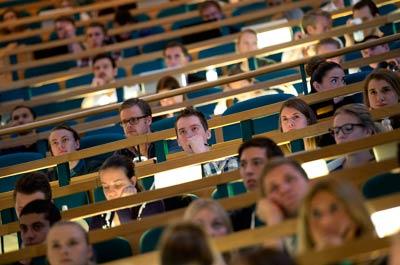
In the digital age, getting students into classrooms is an increasingly challenging mission for university teachers, not to mention retaining their attention.
在这个数码时代,对于大学老师而言,让学生们来听课是项愈发艰巨的任务,更不用说让他们集中精力听讲了。
“It’s much harder to teach the post-90s generation,” said Chen Jixiu, a math professor at Fudan University. “They use smartphones and tablets to search for information, even during class. They get knowledge from a variety of sources, and consider it trivial to skip classes.” According to Chen, this phenomenon has forced teachers to adopt “odd tricks” for luring students to class. Here are some weird ideas picked up by 21st Century.
复旦大学数学系教授陈继秀(音译)表示:“给90后教课可谓难上加难,他们用手机和平板电脑来搜寻信息,甚至在课堂上也是如此。他们获取知识的渠道五花八门,在他们看来跷课只是件寻常小事。”陈教授指出,该现象致使老师们不得不采取些“怪招”吸引学生来上课。以下是《二十一世纪英文报》整理出的一些新奇点子。
Food for thought
食物激励
Rather than providing only moral encouragement, teachers at Wuhan University of Technology are offering tangible incentives to boost student attendance.
为了提高出勤率,武汉科技大学的老师们不只从精神上鼓励学生,更是采用物质激励法。
Students sitting in the first row of the health psychology course taught by professor Lei Wuming are rewarded with snacks.
在雷五明(音译)教授的心理健康课上,坐在第一排的学生会得到零食作为奖励。
“I’ve accumulated 7,000 fans on my micro blog, and most of them are my students,” said Lei, director of the university’s Development and Education Psychology Institution. “I wanted to express my thanks to those coming to listen, and to make the class more lively.”
雷教授是该校发展与教育心理研究所的所长,他说:“我的微博粉丝数已达到7000多了,其中大都是我的学生。我希望对前来听课的学生表示感谢,让课堂变得更加生动活泼。”
Teacher vs phone
老师PK手机
In the broadcasting and hosting course of Hankou University in Hubei, teacher Huang Huiqiong gives students permission to busy themselves with their cell phones during class.
在湖北汉口大学的播音主持课上,黄惠琼(音译)老师允许学生在课上专注于手机。
They keep their heads down until they hear something interesting. If not, they can sit through the entire class without being disturbed and even give the teacher advice following the class. “A teacher is not the boss and students have the right to make content suggestions,” said Huang.
学生们一直低着头,直到听到有趣的内容。如果课堂毫无趣味可言,他们可以把一节课的时间都花在手机上,丝毫不受干扰;甚至还可以在课后给老师提建议。黄老师说:“老师不是老板,学生有权利提出合理意见。”
Friendly blogs
微博来做良师益友
You might hesitate to participate in class discussions, but what if you could send a message instead of speaking out loud? In the computer science course at Changsha University of Science & Technology (CUST), students can voice opinions via their cell phone.
你也许会为是否参加课上讨论而犹豫不决,那么如果改用发信息的方式来表达观点呢?在长沙科技大学的计算机专业课上,学生可以通过手机来表达观点。
“I open a micro blog webpage and when students text a message to the account it appears on the screen,” said teacher Huang Qiang.
黄强(音译)老师说:“我打开微博页面,当学生发来私信时,它就会显示在屏幕上。”
Su Ying, 19, a sophomore at CUST, said: “I feel relaxed as I don’t like standing up and getting everybody’s attention.”
该校大二学生、19岁的苏樱(音译)说:“我觉得很放松,因为我不喜欢站起来,接受所有人目光的洗礼。”
At Beijing University of Posts and Telecommunications, students who arrive at the laboratory early are rewarded with a message of praise on a micro blog named “BUPT CAD center attendance machine”. It might say something like: “Edison invented the first bulb; Bell invented the first telephone; and this morning, Xiao Li printed the first fingerprint.”
北京邮电大学的学生如果早到实验室,便会获得由“北邮CAD中心考勤机器”微博发来的奖励信息消息。内容大致为:“爱迪生发明了第一只灯泡,贝尔发明了第一部电话,今早,小李印下了第一枚指纹。”
The machine, which sends a message whenever a student places their finger on it, was invented by Song Meina, a computer professor. “Students wrote the posts themselves. If they come first, they are praised in front of 2,000 fans,” the professor said.
这台会发信息的指纹考勤机的发明者是该校计算机系教授宋美娜(音译)。她说:“微博内容都是学生自己写的。如果他们来得早,便会在2000多名粉丝面前接受表扬。”
Kung fu style
功夫范儿
Splitting bricks by hand usually only happens in movies. But in a class at Sichuan University, Wei Yaoyong, dean of the computer science department, did just that. But he didn’t just want to attract attention.
徒手劈砖通常只在电影中出现,而在四川大学的课堂上,计算机科学系系主任魏骁勇就上演了一幕徒手劈砖。但他并不只是想吸引同学的关注。
“I wanted to tell my students that even when you only know some simple science principles, if you use them right, you can achieve great things,” said Wei. “I want them to know that university is not only about doing research, but also about employing your practical knowledge.”
魏骁勇说:“我想告诉学生们,即使你只知道一些简单的科学原理,如果应用得当,你也可以成就大事。我想让他们知道,大学不仅仅是做科研的地方,也是运用实践知识的地方。”


